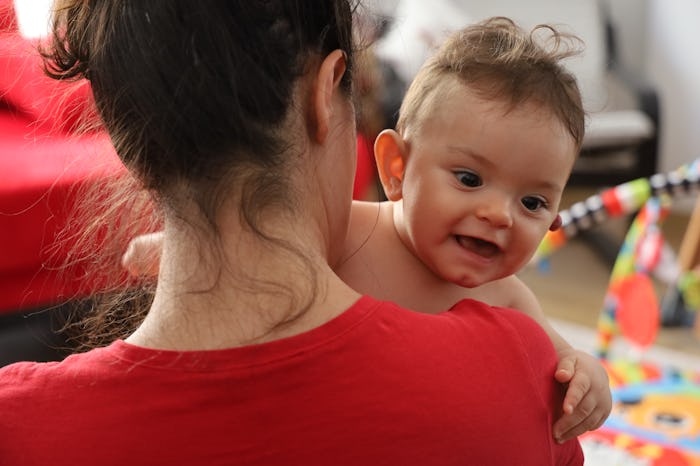News

A Lot Of Families Are Facing Serious Financial Problems Right Now, New Report Finds
Between school closures and a skyrocketing unemployment rate, it's clear the COVID-19 crisis has had serious consequences far beyond the physical spread of the virus. For families especially — many of whom have faced job loss, increased food insecurity, interrupted child care, and the demands of remote learning — the financial impact of the pandemic has been huge. In fact, a new survey found that 61% of U.S. households with kids are facing serious financial problems such as debt, depleted savings, and trouble paying bills right now.
A new poll conducted jointly by NPR, the Robert Wood Johnson Foundation, and the Harvard T.H. Chan School of Public Health and released Wednesday found that although a majority of households with children under 18 have reported experiencing financial difficulties, households of color were more likely to report such problems. While 51% of white households with children reported experiencing serious financial problems, 86% of Latino households and 66% of Black households reported the same.
For many families, job or income loss represents a serious problem. Some 60% of U.S. households with children polled reported at least one adult in the family had lost their job or business, been furloughed, or had their wages or hours cut since the coronavirus pandemic began. Unsurprisingly, the Impact of Coronavirus on Households with Children poll found that households dealing with job loss or income reduction were more likely to be experiencing financial hardships. Among the 60% of families facing the loss of a job or wages, 76% reported facing serious financial problems.
Overall, 44% of U.S. households with children under 18 reported having already depleted or nearly depleted their savings due to the coronavirus pandemic. An additional 11% of families reported not having had any savings to draw from to begin with.
"These findings raise important concerns about the limited financial resources of these households to weather long-term financial and health effects of the coronavirus outbreak, as a large share have depleted their savings and report having major problems paying for basic costs of living, including food, rent, and medical care," the report noted. "In addition, these reported experiences may have a significant impact on economic and health outcomes for both adults and children living in these households in the long-term."
But finances aren't the only issue families with children are facing as a result of the coronavirus pandemic. More than half of the U.S. households with children surveyed — 59% — reported experiencing serious problems caring for their children due to things like school closures and child care interruptions. What's more, 36% said they were having serious problems continuing their child's education while another 34% reported either not having an internet connection at home or having problems with their internet that made schoolwork and remote jobs difficult.
"Before federal coronavirus support programs even expired, we find millions of families with very serious problems with their finances and with educating their children," Robert J. Blendon, the survey's co-director and a professor public health, health policy and political analysis at Harvard T.H. Chan School of Public Health, said in a statement. "Our findings suggest there could be long-term, harmful effects on the education of children if this situation doesn't change."
If you think you’re showing symptoms of coronavirus, which include fever, shortness of breath, and cough, call your doctor before going to get tested. If you’re anxious about the virus’s spread in your community, visit the CDC for up-to-date information and resources, or seek out mental health support. You can find all of Romper’s parents + coronavirus coverage here.